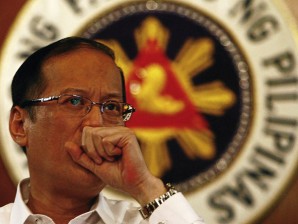
President Benigno Aquino III
LUCENA CITY, Philippines—Millions of poor coconut farmers across the country will continue to remain destitute even with the improved export index of Philippine’s “coco water,” an official of the militant farmers group Kilusang Magbubukid ng Pilipinas said Tuesday.
KMP deputy secretary general Willy Marbella in a phone interview said the big landlords, who control most of the country’s coconut farmlands, and agribusiness companies would be the ones to benefit from the export of coco water.
Prior to his campaign sortie in Catanauan, Quezon on Monday for Team PNoy candidates, President Benigno Aquino III visited Peter Paul Philippine Corp. in Candelaria town, one of the country’s manufacturers of coconut-based products, including desiccated coconut and coco water in tetra pack for export.
Marbella dared Liberal Party senatorial bets to speak on their plans, once elected, on the controversial P72-billion coconut levy fund that is now in government hands.
He expressed disgust over the administration candidates’ continuing silence and apparent snub of the small coconut farmers’ demand for a return of the coco levy fund when it is already midway through the campaign period.
He said Mr. Aquino and Team PNoy’s senatorial candidates’ tight-lipped stance on the coco levy issue will be paid back with a “zero-votes campaign” by peasants all over the country.
The multibillion-peso coconut levy fund is expected to benefit more than 20 million coconut farmers and their families living in more than 21,000 coconut-producing villages across the country.
The KMP, the Kaisahang Pambansa ng mga Magsasaka sa Koprahan (Koprahan), and the claimants” movement Coco Levy Funds Ibalik sa Amin (CLAIM) are proposing that “genuine and legitimate small coconut farmers” become the primary beneficiaries of the coco levy funds in the form of cash and other social benefits.
Last month, Agriculture Secretary Proceso Alcala slammed anew the proposed distribution of the nearly P70-billion coconut levy fund to individual farmers.
He suggested that the assets be used to rehabilitate and modernize the industry so that benefits would trickle down to the poorest coconut farmer.
Under Alcala’s proposal, the coco levy fund will be placed in a perpetual trust fund and part of its earnings to be used in the long-neglected research and development of the coconut industry.
The Presidential Task Force on the Coco Levy Funds has also been pushing for the allocation of P11.17 billion from the coco levy fund for its “Poverty Reduction Program for the Coconut Industry” project.
“Cash distribution will be in the form of social benefits. This is not a dole-out and a far cry from the corruption-ridden conditional cash transfer (CCT) program included in the NAPC roadmap,” Marbella said.
Coconut farmers from Quezon are believed to be the biggest contributors to the coco levy fund, a tax exacted from them between 1973 and 1982 during the dictatorship of Ferdinand Marcos.

